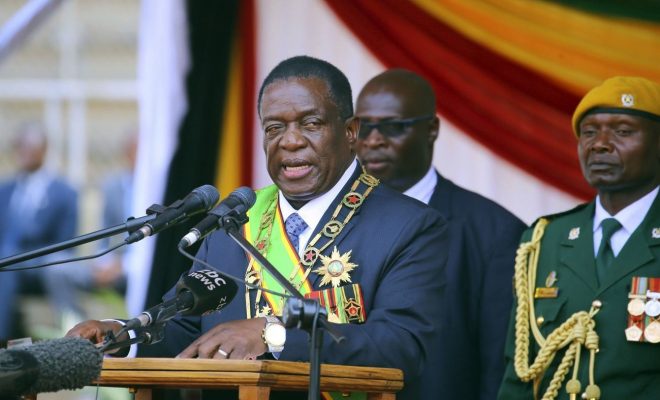By Blessings Mashaya
President Emmerson Mnangagwa yesterday promised to rebuild the country’s shattered economy as he took oath of office which ended weeks of anxiety created by a Constitutional Court challenge to his disputed July 30 victory.

The 75-year-old Zanu PF leader became the second executive President of Zimbabwe after the Con-Court on Friday threw out a poll petition by opposition leader Nelson Chamisa who had accused Mnangagwa of winning the hotly-disputed election by cheating.
Addressing thousands of Zimbabweans and African leaders who included South African President Cyril Ramaphosa and African Union chairperson Paul Kagame of Rwanda at the giant National Sports Stadium, Mnangagwa said his focus was now on rebuilding the economy.
“Now is the time for us all to unite as a nation and grow our economy. I exhort us to commit ourselves collectively to develop our motherland… what unites us is greater than what could ever divide us.
“Now that elections are behind us we must face economic challenges facing our nation. The creation of jobs will be at the core of our policies. Vision of a new Zimbabwe is a shared vision which knows no political party,” Mnangagwa said.
“Thank you for the confidence you have installed in me. I will work tirelessly as a servant leader for a better Zimbabwe. I exhort all parties especially those in Parliament to work for our motherland. Tomorrow is brighter than yesterday.
“My government will in next the five years accelerate modernisation with emphasis on market development policies. We will modernise major roads, airports and railway lines,” Mnangagwa told the cheering crowds.
“There is need for revamping of social services sector and government will move fast to refurbish water reticulation infrastructure. These are promises we will deliver on. My administration will continue with the advancement of youth and women empowerment. My administration expects speedy implementation. Unnecessary bureaucracy will not be tolerated under my administration.
“No one is above the law…this is a new Zimbabwe. On devolution of power, provinces should now plan development of their provinces. Local authorities should be the development engines in the second republic. It will not be easy. We have endured and toiled but we will reap a more prosperous future. We must work together….nothing is beyond our reach,” he added.
Zimbabwe held its first ever post-independence elections late last month without deposed former leader Robert Mugabe — who resigned from office in November last year on the back of a military intervention.
Millions of Zimbabweans cast their vote in the historic July 30 elections to choose both a new Parliament and president — following Mugabe’s dramatic fall from power.
The elections also marked the first time that the main opposition MDC was not represented by its founding leader Morgan Tsvangirai, who lost his brave battle with cancer of the colon on Valentine’s Day this year.
Zanu PF bagged two thirds parliamentary majority in the plebiscite.
However, the peaceful campaigns and a camaraderie spirit that had characterised the run-up to the elections were sullied in the aftermath of the polls when deadly violence broke out in Harare’s central business district (CBD), following clashes between opposition supporters and security agents.
At least six people subsequently died when the army used live ammunition to break the ugly protests.
Following the ugly protests, the opposition also asserted that suspected security agents had been involved in retributive exercises in which they targeted senior MDC Alliance officials and polling agents — following the insistence by Chamisa that he had won the presidential election.
All this was seen by observers as harming Mnangagwa’s quest to mend years of Zimbabwe’s political and economic isolation by Western governments.
Mnangagwa was credited with presiding over arguably the most peaceful election process in post-independent Zimbabwe — where for the first time the opposition was able to campaign freely in rural areas which were traditionally strongholds for the ruling Zanu PF. Daily News






